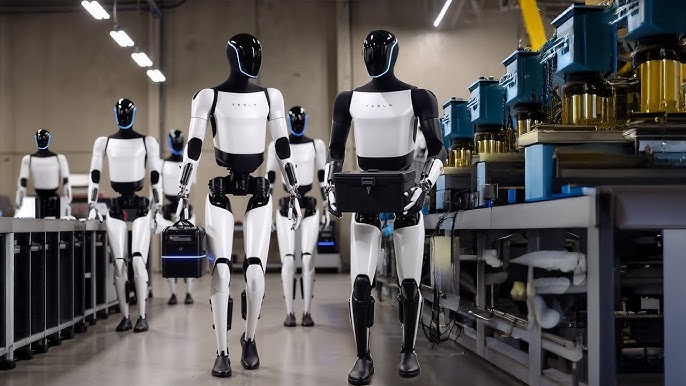Humanoid Robots Build More Humanoid Robots
Elon Musk sees a billion-dollar market for his humanoid robot Optimus by 2030. Apollo from Apptronik is another market entrant. Others will follow. The combination of insanely “intelligent” AI with enhanced dexterity and mobility will replace human labour in production. Worse still: robots will soon manufacture and repair themselves. Mass production is expected by the end of 2025.

The self-replicating robot revolution is gaining momentum: Apptronik’s humanoid Apollo robot is preparing to participate in the creation of its own copies. This is made possible by a partnership between the Texas-based robotics company and Jabil, a global technology solutions provider that produces components for Apple, Dell, and HP, among others.
As part of this collaboration, Apollo robots will be deployed as “workers” in Jabil’s manufacturing facilities, including the factories where the Apollo bots are made.
Before he can get there, however, Apollo has to prove himself. Initially, he will be entrusted with a series of simple, repetitive tasks in intralogistics and manufacturing, including inspection, sorting, picking, delivery to the assembly line, fixture placement, and pre-assembly. In the long term, he will be deployed in fully functioning production facilities, instead of human workers.
At the same time, Jabil is pushing ahead with scaling Apollo production with the goal of offering the humanoid robot at a competitive price to Apptronik’s customers. Apollo was first unveiled in 2023 and it is still in the testing phase.
The robot is 175 cm tall, can carry payloads of up to 8 kg, and operates for four hours on a single battery charge. It is currently capable of performing basic tasks such as loading and unloading cargo and transporting crates around warehouses. Expanding its functionality to include product assembly capabilities would be a major step forward for the bipedal bot.

Naturally, the manufacturer believes Apollo is destined for bigger tasks. Last year, Apptronik delivered the first Apollo bots to Mercedes-Benz to assist human workers in car assembly. However, as TechCrunch reports, this project is still in the pilot phase.
Apptronik also raised an impressive $350 million in a Series A funding round in just one month, to further advance Apollo’s production. Last December, the company partnered with Google DeepMind to give the robot AI capabilities.
Rafael Renno, Senior Vice President of Global Business Units at Jabil, emphasizes the importance of this project for the factories of the future: “By testing Apollo in our factories, we not only gain valuable insights into the impact of universal robots, but also actively contribute to the future of manufacturing through the production of Apollo units.”
Apptronik hasn’t yet announced how much Apollo will cost at launch. But there are some initial indications: Unitree’s G1 costs around $16,000, and Tesla’s Optimus is expected to cost between $20,000 and $30,000.
While Apptronik is currently testing Apollo’s manufacturing capabilities, the company has a far-reaching vision: to make humanoid robots ubiquitous and expand them into new markets and roles—from retail to elderly care to private homes.
yogaesoteric
March 30, 2025
